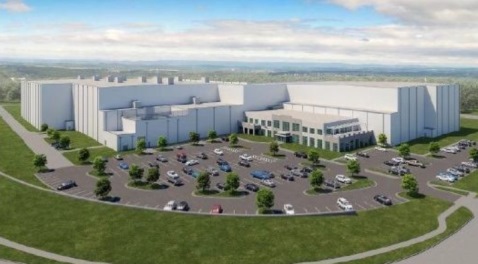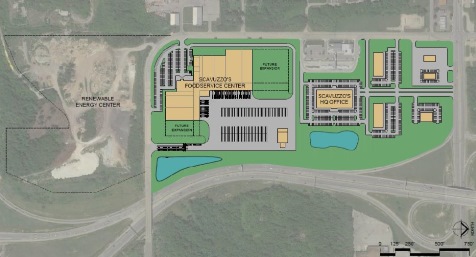

There’s new life for the old Indian Springs mall site at 47th and State Avenue in Kansas City, Kansas.
The Unified Government Commission unanimously approved a development agreement and economic incentives on Thursday night for the new KC Foodie Park, a $140 million development that will be on the old Indian Springs site.
The development’s first building will be an industrial-style food center.
Construction on the 266,000-square-foot food service center may start right away, as early as the fourth quarter of 2019, according to Richard Scavuzzo, CEO of Scavuzzo’s Food Service, the developer.
The agreement states construction on the $110 million food service center must begin by Dec. 31, 2019.
The family-owned Scavuzzo’s firm has been in business about a century, mostly in the Kansas City area, and now has expanded to serve clients in 14 states, Scavuzzo said.
The developer plans to use state-of-the-art technology in the new distribution facility – something that will put this development ahead of the rest of his industry, according to Scavuzzo.
Later phases of the project will include some restaurant pads on State Avenue, some other commercial buildings and an office building.
Scavuzzo’s will build its office headquarters at the site. There is a seven-year buildout time for all the phases.
The development also includes a solar field that will produce energy necessary to run the buildings.
Scavuzzo said he has had phone calls from people interested in developing other areas near 47th and State.
UG officials are hoping that the redevelopment at Foodie Park will spur other development nearby.
Scavuzzo said about 70 new jobs with Scavuzzo’s food service center would be created with this development. About an additional 68 jobs would be relocated from Scavuzzo’s current location on Kansas Avenue.
From 400 to 900 employees eventually could be on site at the development, which would include employees of other businesses located there, he said.
Also, he said he has started a program with local high school students to interest them in the food industry.
The Unified Government has done a great job with The Legends and areas west on State Avenue, Scavuzzo said.
“We want this project to be the catalyst to redevelopment going the other direction,” Scavuzzo said.
Twenty-year transition
The 700,000-square-foot Indian Springs mall, which opened in 1971, had not been at full strength for about two decades. Montgomery Ward, the last big anchor, left the mall in 2001. The mall’s location is near the intersection of I-635 and I-70.
The UG was poised to bring a retail development to the old Indian Springs site in 2009, but when a recession hit and the developer for the project died, the project did not move forward. The last business, Italian Delight, left Indian Springs in 2010.
As recently as four years ago, UG officials were still trying to get retail stores to locate at Indian Springs. The mall was torn down in 2016.
In more recent years, however, they cited a trend toward customers changing their shopping habits to online, and looked for mixed-use industrial, commercial and office developments for the site.
Public hearing
At the UG Commission meeting Sept. 26, two persons opposed the development.
Edward Despain, who lives in the area, raised several questions, and was concerned about the possibility of nearby homes being bought out by future developments, truck traffic on State Avenue, and the value of his home, among other issues.
Faith Rivera, a Rosedale resident who is running for the Board of Public Utilities at large, said the residents in the area are looking for a grocery store with fresh food, and suggested putting a grocery store there. An Aldi grocery store currently is about two blocks from Indian Springs.
Also, she said she was concerned about trucks going up and down streets, and property values.
Also appearing at the public hearing was Greg Kindle, president of the Wyandotte Economic Development Council, who supported the project.
“We’re impressed by the excitement expressed by the Scavuzzo family,” Kindle said.
It is a Kansas City, Kansas, company that chose to stay in this city to expand, and specifically selected this site as a way to start a new chapter for their company and the location.
“For Scavuzzo’s, this location is not a default location, but rather a place to showcase their capabilities, highlight the prominence of the food industry in Wyandotte County, and to grow their national footprint from our community to the nation,” Kindle said.
He also cited the 70 additional jobs coming to the area.
The 15 acres in this project being developed for retail use are in line with the other shopping areas in the community, he added, most of which are about 15 acres.
Commission support
Commissioner Mike Kane asked Scavuzzo if they would try to hire as many contractors in Wyandotte County as possible, and Scavuzzo said that was a focus of theirs.
“I’m going to hold you to it,” Kane said.
Scavuzzo said they contracted with Primus Builders and gave them instructions to engage with the local community.
Mayor David Alvey said he was impressed by the family commitment to Kansas City, Kansas, and the family pride in the enterprise and their vision for moving forward.
“You will become the leader in this industry. That’s very significant, it helps to showcase what is available in Kansas City, Kansas. I’m very encouraged to hear you speak to the issue of day care. We have a desperate need for quality day care here in Wyandotte County, and that location by the transit center is an important piece of that. For folks of limited means, it’s hard to get to day care and hard to afford it, even if it’s available.”
“Activating this site besides a large gravel field is important,” Alvey said.
“As much as so many people would like a return to Indian Springs, it’s not coming, That’s just not the retail environment any more,” he said. “This is a great use of this property and I think I’m really impressed by the family pride and your commitment to our community.”
Commissioner Jane Philbrook said they would like to know they will carry through with this project, and the complicated development agreement is written so they will not be rewarded if they don’t follow through.
“I so look forward to seeing this campus done and a lot of this retail coming forward, and you helping that area grow significantly,” Philbrook said.
The deal’s details
Katherine Carttar, the UG’s economic development director, said the project is a combination of bringing quality jobs to the area, growing a local company, including retail, and using the investment in the transit hub at Indian Springs, and meeting all the goals the community set forth for the site.
Under the development agreement, the UG will be paid a little over $1 million for the Indian Springs land.
In the first phase, the southwest part of the Indian Springs property, the land will go to the developer for free. In the next three phases, the developer will pay the UG.
Originally, the developer would have received the entire property for free under an earlier proposal, but after UG commissioners requested, they went back to make changes, negotiating a price of $1.05 million.
The agreement calls for the UG to give the property for the first phase to the developer, and the developer would pay $350,000 each for the land in the second, third and fourth phases. Those funds would be paid at the time the developer begins the phase, according to officials.
The project includes tax-increment financing in pay-as-you-go basis for site work and infrastructure, with financing capped and tied to delivery of minimum improvements, Carttar said at the UG meeting.
A community improvement district will be created with a CID sales tax of 1 percent on retail sales with proceeds used for pay-as-you-go financing, she said.
A sales tax exemption through industrial revenue bonds will be on construction materials.
In addition, there is a home rule sales tax rebate, with the developer recovering eligible costs to be paid through the UG’s portion of sales tax generated by the project with a cap in place, according to Carttar.
Carttar said the maximum amount of public assistance the project could receive is $34.7 million over a 20-year period, if all phases are built within the specified time.
She said only future development tax dollars are used, no general fund contribution or UG-backed bonds are in this proposal.
The project should generate about $10 million in sales and property taxes, according to Carttar, during the 20-year public assistance period, then close to $1 million to $2 million annually afterward in property taxes.
To see an earlier story on the KC Foodie Park, visit https://wyandotteonline.com/kc-foodie-park-development-agreement-for-former-indian-springs-site-advances/.
